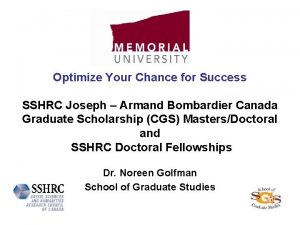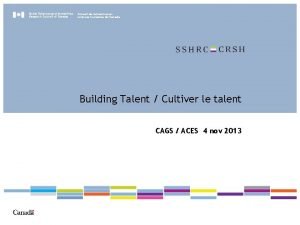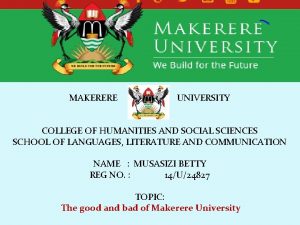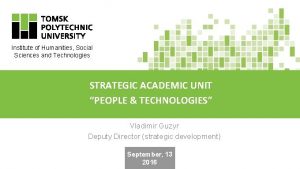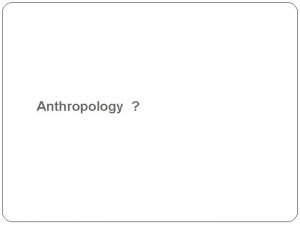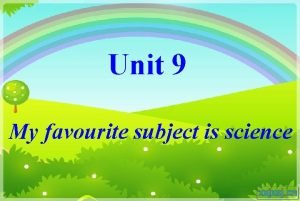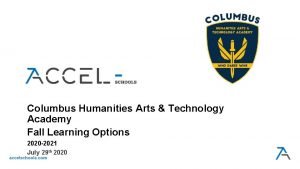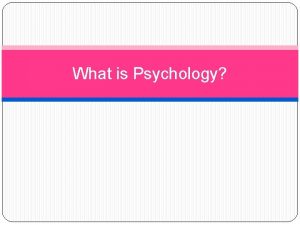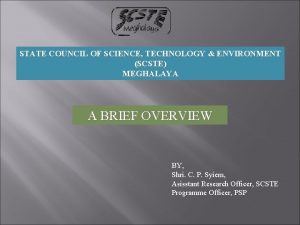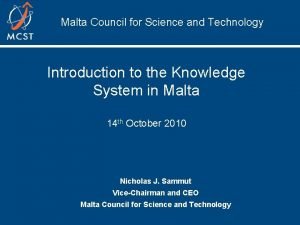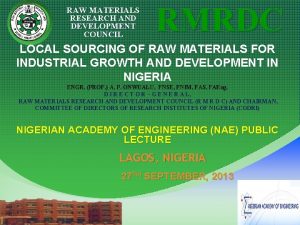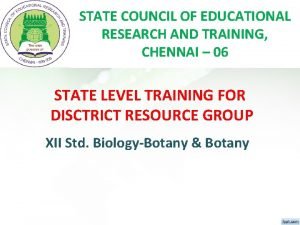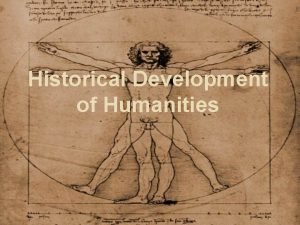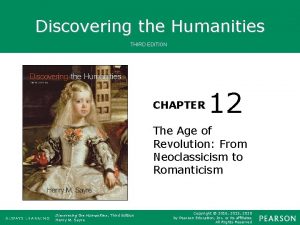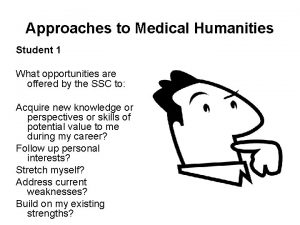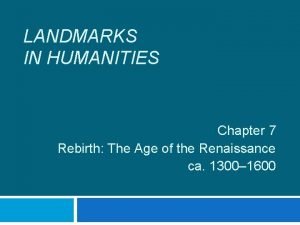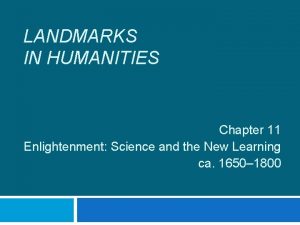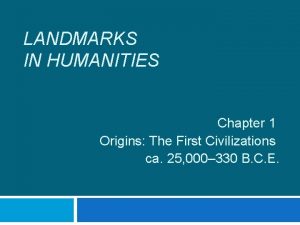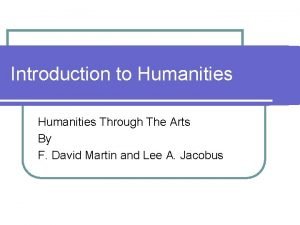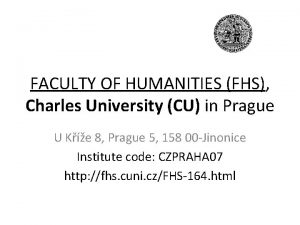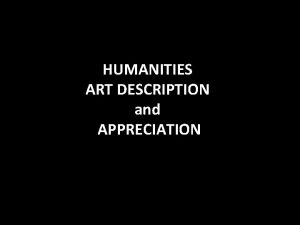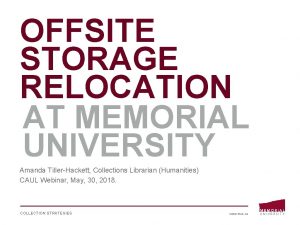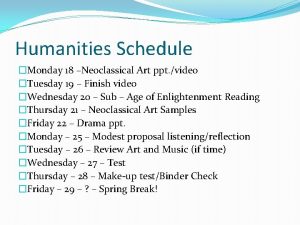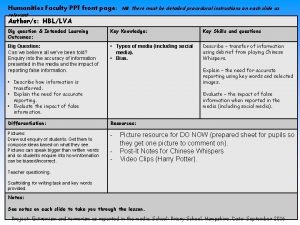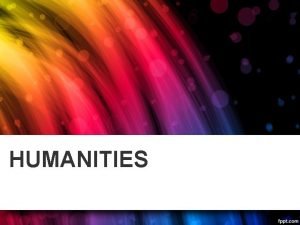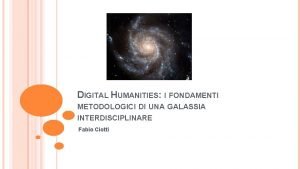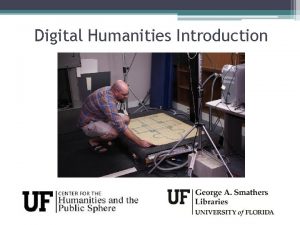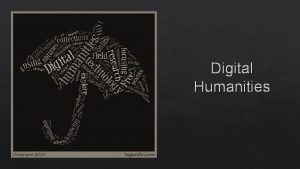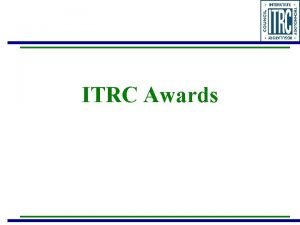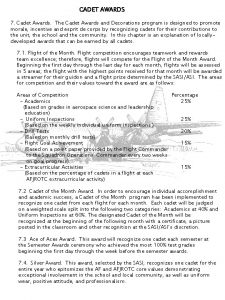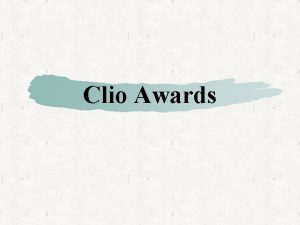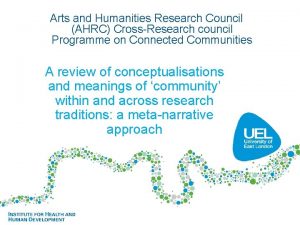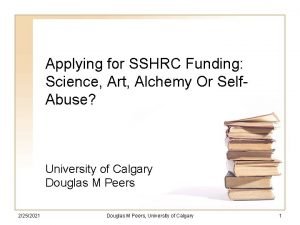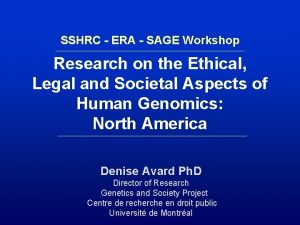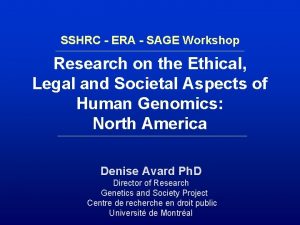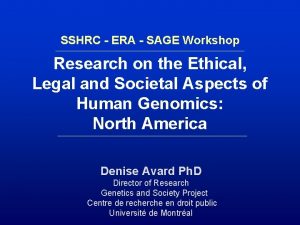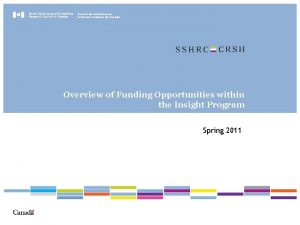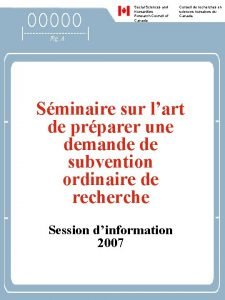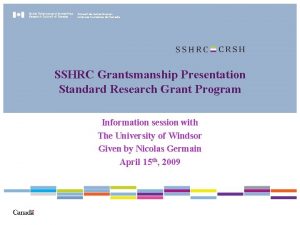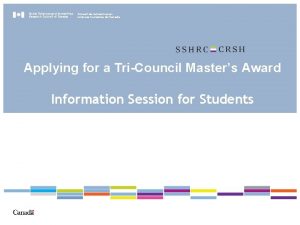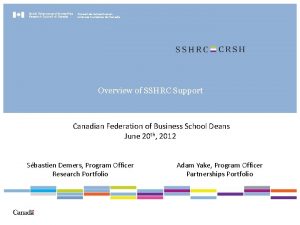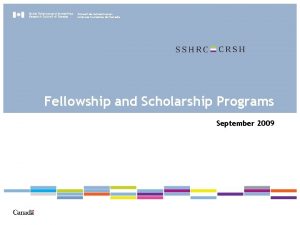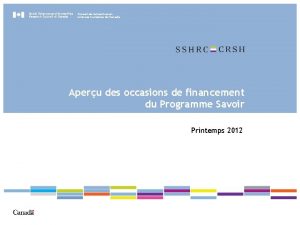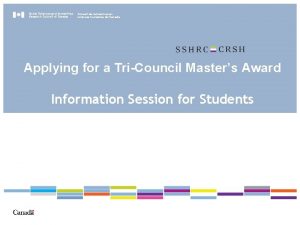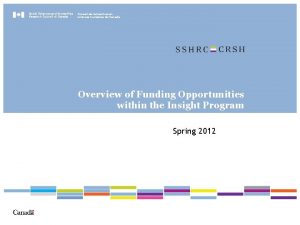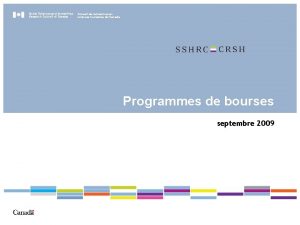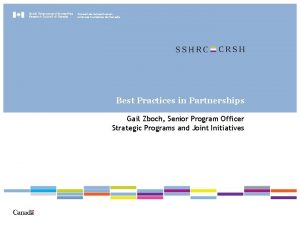Social Science and Humanities Research Council SSHRC Awards

































- Slides: 33

Social Science and Humanities Research Council (SSHRC) Awards Presentation Dr. Pamela Osmond-Johnson Faculty of Education With Credit to U of C student workshop http: //grad. ucalgary. ca/files/grad/tricouncil_cgs _masters_scholarships_2014 -rev. pdf

Outline What is SSHRC? Eligibility Application and selection process Criteria for selection Preparing the application Tips from successful applicants Q and A Sample program of study

What is SSHRC? SSHRC Social SSHRC Is Sciences and Humanities Research Council represents 1/3 of the Tri-council agencies the primary granting agency for post secondary based research and training in the social sciences and humanities

The Tri-Council Agency

SSHRC Awards CGS Master’s Awards – Deadline December 1 st, 2017 $17, 5000 for one year SSRHC Doctoral Award – Internal Deadline November 13 th, 2017 CGS $35, 000 per year for three years $20, 000 per year for up to four years

Why Apply? Helps you gain experience in proposal and grant writing Helps you clarify your research agenda Creates an ongoing desire to engage in and disseminate research Resume building (especially if you are thinking of doctoral studies) Enables graduate funding from the university to be more broadly distributed Contributes to the research capacity of the University of Regina

SSRHC Subject Matter Eligibility The proposed research or related activities must be primarily in the social sciences and humanities The intended outcome of the research must primarily be to add to our understanding and knowledge of individuals, groups and societies – what we think, how we live, and how we interact with each other and the world around us Investigators whose proposed research is health-related should consult CIHR’s mandate first to explore eligibility. Research eligible under the mandate of CIHR will not be considered by SSHRC Examples of ineligible research include: clinical education for health care professionals; psychomotor research and kinesiology; clinical research (e. g. , treatment, prevention or diagnosis of a condition, disorder or disease; testing or evaluating the impact of interventions, medication or medical aids); therapy (e. g. , counselling, interventions, psychotherapy, rehabilitation, speech and occupational therapy, validation/testing of diagnostic tools); and epidemiology. The use of social science or humanities theories, methodologies and hypothesis is, in and of itself, not sufficient to make a proposal eligible at SSHRC Check CIHR guidelines first if unsure as there are no appeals on this grounds!

Eligibility for Master’s CGS be a Canadian citizen or a permanent resident of Canada; full-time student status (do not need prior acceptance) have completed, as of December 31 of the year of application, between zero and 12 months of full-time studies not have previously held a CGS M have achieved a first-class average, as determined by the host institution, in each of the last two completed years of study (full-time equivalent); submit a maximum of one scholarship application per academic year to either CIHR, NSERC or SSHRC

Eligibility for SSRHC Doctoral Awards be a citizen or permanent resident of Canada; be applying for support to pursue your first Ph. D (or equivalent); do not need prior acceptance not have already received a doctoral-level scholarship or fellowship from the Canadian Institutes of Health Research (CIHR), the Natural Sciences and Engineering Research Council (NSERC) or SSHRC to undertake or complete a doctoral degree; and not be applying in the 2017 -18 academic year to NSERC or CIHR. be registered as a full-time student, undertaking or continuing a doctoral, combined MA/Ph. D, fast-track or direct-entry doctoral program in the social sciences or humanities; and not have exceeded the allowable number of months already spent in doctoral study

Where can I hold the award? CGS Doctoral and Master’s Scholarships are tenable ONLY at eligible universities in Canada. There are no exceptions SSHRC Doctoral Fellowships are tenable at any recognized university in Canada or abroad For the fellowship to be held abroad, the award holder must have completed at least one previous degree at a Canadian university For award holders who do not meet this requirement, the fellowships are tenable only at recognized Canadian postsecondary institutions

Application Process Several components to the application: Online profile CV Program of Studies References Transcripts

Uploading Application All documents uploaded as attachments must be in Portable Document Format (PDF) and must conform to the following presentation standards. Text must be single-spaced, with no more than six lines per inch. The acceptable font is Times New Roman (regular, minimum 12 -pt. ) or a comparable font. Set margins at a minimum of 1. 87 cm (3/4 of an inch) all around. Use a left-justified, standard page layout. Include your name in the page header on every page. For multipage attachments, number the pages sequentially. No changes or updates can be made to an application once it has been submitted. Only personal contact information may be updated through your Research Portal account.






Research Contributions CCV has a section for research contributions (publications, presentations, etc) Doctoral online application does not have this section - research contributions are a separate one-page document that is uploaded as pdf to the online application Include your work in the following areas, highlighting your contributions to coauthored publications Refereed contributions (journal articles, book chapters in edited books) Other referred contributions (presentations, conference proceedings) Non-referred contributions (M. thesis, research reports, articles in non-referred journals Bascia, N. , & Osmond, P. (2013). Teacher union-Governmental relations in the context of educational reform. Belgium: Education International. Contributions: carried out initial literature review, conducted participant interviews, wrote one of the case studies and contributed to the writing and editing of additional sections.

Program of Studies Consists of two separate sections: Outline of proposed research (maximum of one page for Masters; Ph. D 2 pages); Bibliography/citations (maximum of one page for Masters; Ph. D 5 pages). Rationale: State the purpose of your study and your research questions. Position your proposed research within the context of the current knowledge in the field. Where is the gap (significance)? Methods: outline theoretical framework and the methods and procedures to be used. Impact: Why is this potential research important and to whom? How will you disseminate my findings to important stakeholders following completion? Adapted from CGS information page

References & Transcripts If you are contacting former institutions to obtain official transcripts and supporting documents, remember that it may take time for them to provide you with the information requested. The application requires that attachments be uploaded as PDF. It is your responsibility to allow enough time to resolve these formatting issues in advance of the deadline. Plan ahead, in case of delays Allow enough time for your reference assessments and your application to be completed in advance of the application deadline. Contact references at least four weeks before the deadline. Be strategic in who you ask for a reference Provide copy of program of study and CCV Incomplete or late applications are not accepted

Who to Ask Master’s program Doctoral program Currently in MA program: One letter must be from MA supervisor Other letter should be from an expert in your field who know you and your work Currently in Ph. D program: — One letter must be from Ph. D supervisor (if assigned) and one from MA supervisor All else being equal, ask senior, tenured faculty

Master’s Assessment Criteria Academic Excellence: As demonstrated by past academic results, transcripts, awards and distinctions (50%) Research Potential: As demonstrated by the applicant’s research history, his/her interest in discovery, the proposed research, its potential contribution to the advancement of knowledge in the field, and any anticipated outcomes (30%) Personal characteristics & interpersonal skills: As demonstrated by the applicant’s past professional and relevant extracurricular interactions and collaborations (20%)

Academics Academic Record Scholarships/Awards Duration of studies Type of program and courses taken Course load Relative standing Tri-Council uses last 2 years of GPA for eligibility, but reviewers might look as far back as first year. Since this section is worth 50%, do everything you can to address each of the selection criteria Reference letters Supplemental attachments

Research Potential Quality/originality of contributions Relevance of work experience to proposed research Significance and feasibility of proposed work Judgment and ability to think critically Ability to apply skills and knowledge Initiative and independence Research achievements relative to academic experience

Personal Characteristics Work experience Leadership experience Project management including organizing meetings Ability to communicate technical concepts clearly in written and oral formats Involvement in academic life Volunteerism/community outreach

Doctoral Assessment Criteria Multi-disciplinary selection committees evaluate applicants solely on academic merit, measured by: past academic results, as demonstrated by transcripts, awards and distinctions; the program of study and its potential contribution to the advancement of knowledge; relevant professional and academic experience, including research training, as demonstrated by conference presentations and scholarly publications; two written evaluations from referees; and the departmental appraisal (your unit will provide this to FGSR)

Adjudication Process For CGS Master’s U of R selects the recipients internally via multi-disciplinary committee Granted 8 Master’s awards for 2018 -19 For Doctoral awards, U of R committee selects candiates to go forward to the National level competition Granted 5 submissions for 2018 -19

Student Panel Cassandra Ozog Mandy Woth

Questions?

Group Activity Groups of 2 -3 people Read through the two drafts of sample program of study. Which do you think was the final draft? Why? How was it an improvement over the first?

Tips Keep it simple – don’t use a ton of jargon. Remember, the committee is multidisciplinary so make sure anyone can understand the purpose Feasibility is a big deal – you aren’t undertaking your life’s work. Highlight impact and significance – why is your research important? Use headings and indentations to make it visually appealing Give yourself lots of time to prepare all the documents – start NOW! Write, write, and re-write!


Contacts Darlene Sorenson Manager, Graduate Scholarships and Awards Faculty of Graduate Studies and Research Paskwāw Tower (North Residence) Email: Grad. Funding@uregina. ca Phone: 306 -337 -2444 (front desk)
 Joseph armand bombardier sshrc
Joseph armand bombardier sshrc Sshrc partnership development grant
Sshrc partnership development grant Sshrc talent award
Sshrc talent award College of humanities and social sciences
College of humanities and social sciences Humanities and social sciences
Humanities and social sciences Rapid change
Rapid change What is his favorite subject?
What is his favorite subject? Columbus humanities arts and technology academy
Columbus humanities arts and technology academy Art and humanities endorsement
Art and humanities endorsement Arts and humanities endorsement
Arts and humanities endorsement Social science vs natural science
Social science vs natural science Scste
Scste Malta council for science and technology
Malta council for science and technology Raw material research and development council
Raw material research and development council Tnscert
Tnscert What is humanities
What is humanities Discovering the humanities 4th edition
Discovering the humanities 4th edition What is medical humanities
What is medical humanities Landmarks in humanities 5th edition
Landmarks in humanities 5th edition Landmarks in humanities
Landmarks in humanities Landmarks in humanities 5th edition chapter 1
Landmarks in humanities 5th edition chapter 1 Humanities through the arts
Humanities through the arts Humanities 101 art appreciation
Humanities 101 art appreciation Webkredit cuni
Webkredit cuni Humanities art appreciation
Humanities art appreciation Local guide program
Local guide program What is humanities
What is humanities Humanities group
Humanities group Essay about humanities
Essay about humanities Ca humanities
Ca humanities Humanities art appreciation ppt
Humanities art appreciation ppt Introduction to humanities ppt
Introduction to humanities ppt Functions of art meaning
Functions of art meaning Digital humanities
Digital humanities
